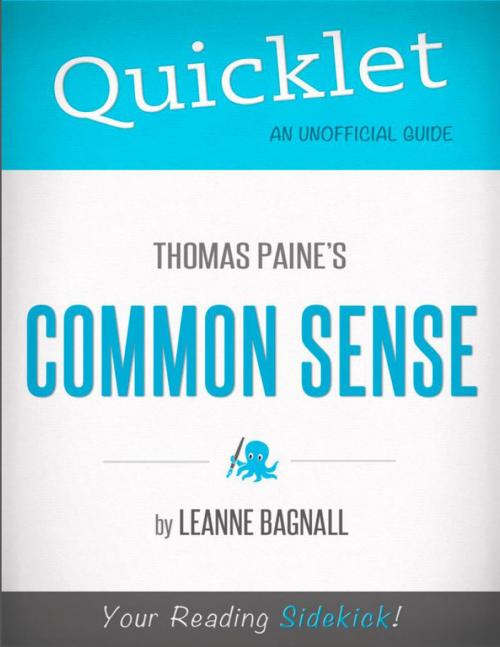Quicklet on Thomas Paine's Common Sense (CliffsNotes-like Book Summary)
Nonfiction, Reference & Language, Study Aids, Book Notes, Art & Architecture, General Art| Author: | LeAnne Bagnall | ISBN: | 9781614648895 |
| Publisher: | Hyperink | Publication: | February 29, 2012 |
| Imprint: | Hyperink | Language: | English |
| Author: | LeAnne Bagnall |
| ISBN: | 9781614648895 |
| Publisher: | Hyperink |
| Publication: | February 29, 2012 |
| Imprint: | Hyperink |
| Language: | English |
ABOUT THE BOOK
No, you shouldn’t only read Common Sense because it’s going to appear on your upcoming AP exam (although this writer was no exception to that rule during her time). A critique of America’s then-state of oppression—whose words helped launched the open debate for independence and paved the way for the American Revolution—holds as much relevance for today’s audience as it did during Paine’s era. Paine, the masterful writer, not only captured the sentiments of his generation of restless colonists eager for freedom, but has continued to do so today through his words’ timeless ability to incite ongoing generations of protesters and civil rights revolutionists in their expeditions for equality and justice.
For this writer, Paine’s triumph into fame by way of his daring prose remains a high source of inspiration for my own passion to share through the written word (and a personal reminder to not be afraid of expressing my ideas, as I become my own worst critic). Paine is proof that well-written, passionate prose has the power to stir revolutions! Besides, when can you ever deny needing a little common sense for yourself?
MEET THE AUTHOR
LeAnne Bagnall is a professional Los Angeles-based writer and editor who specializes in American literature, culture, lifestyle, health, and community. She earned a BA in English from the University of California, Santa Barbara with a Specialization in American Cultures and Global Contexts.
EXCERPT FROM THE BOOK
In the second section, Paine brusquely refutes the principles of monarchy and of hereditary succession. Paine references the Bible several times to make his case that the foundation of a monarchy is plainly against the path of the scripture. He calls the government of kings outright idolatry, a form of government which did not result from divinity or from nature—but rather from the “Heathens” who sprang from unruly gangs and ruthlessly conquered their way into power against the will of the people.
Quite bold for his day, Paine unabashedly refers to the founder of England’s monarchy, William the Conqueror, as “a French bastard” who pillaged his way to prideful leadership against the will of the people. Furthermore, the hereditary succession of kings does not guarantee that moral virtue is also hereditary, and that future generations will continually be ruled by gracious leaders on the throne. The passing of elderly kings to their infant sons can leave nations in a state of vulnerability in which special interest, enemies, and corruption can thrive...
Buy a copy to keep reading!
ABOUT THE BOOK
No, you shouldn’t only read Common Sense because it’s going to appear on your upcoming AP exam (although this writer was no exception to that rule during her time). A critique of America’s then-state of oppression—whose words helped launched the open debate for independence and paved the way for the American Revolution—holds as much relevance for today’s audience as it did during Paine’s era. Paine, the masterful writer, not only captured the sentiments of his generation of restless colonists eager for freedom, but has continued to do so today through his words’ timeless ability to incite ongoing generations of protesters and civil rights revolutionists in their expeditions for equality and justice.
For this writer, Paine’s triumph into fame by way of his daring prose remains a high source of inspiration for my own passion to share through the written word (and a personal reminder to not be afraid of expressing my ideas, as I become my own worst critic). Paine is proof that well-written, passionate prose has the power to stir revolutions! Besides, when can you ever deny needing a little common sense for yourself?
MEET THE AUTHOR
LeAnne Bagnall is a professional Los Angeles-based writer and editor who specializes in American literature, culture, lifestyle, health, and community. She earned a BA in English from the University of California, Santa Barbara with a Specialization in American Cultures and Global Contexts.
EXCERPT FROM THE BOOK
In the second section, Paine brusquely refutes the principles of monarchy and of hereditary succession. Paine references the Bible several times to make his case that the foundation of a monarchy is plainly against the path of the scripture. He calls the government of kings outright idolatry, a form of government which did not result from divinity or from nature—but rather from the “Heathens” who sprang from unruly gangs and ruthlessly conquered their way into power against the will of the people.
Quite bold for his day, Paine unabashedly refers to the founder of England’s monarchy, William the Conqueror, as “a French bastard” who pillaged his way to prideful leadership against the will of the people. Furthermore, the hereditary succession of kings does not guarantee that moral virtue is also hereditary, and that future generations will continually be ruled by gracious leaders on the throne. The passing of elderly kings to their infant sons can leave nations in a state of vulnerability in which special interest, enemies, and corruption can thrive...
Buy a copy to keep reading!















